Studio Zhu Pei's solo exhibition "Mind Landscapes" opened at Aedes in Berlin
2017.04.01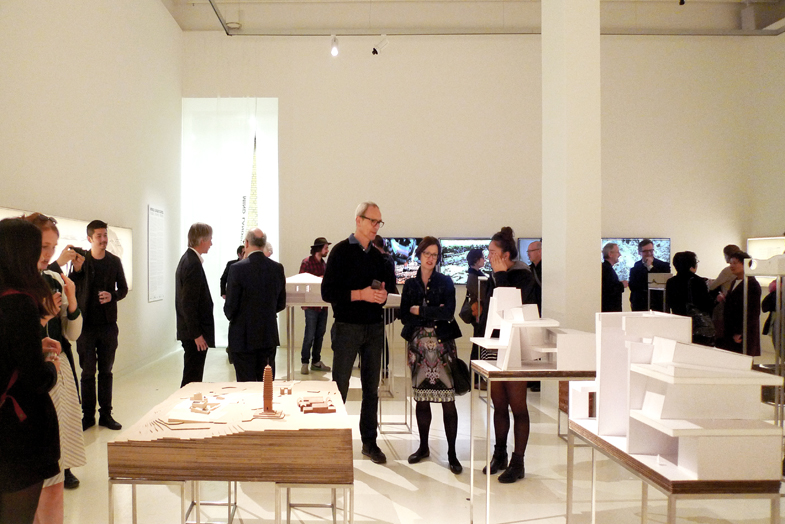
On March 31, Studio Zhu Pei’s first architectural solo exhibition "Mind Landscapes" opened at Aedes in Berlin.
The exhibition theme "Mind Landscape" directly introduces the aesthetic concept of "artistic conception" in traditional Chinese landscape painting. This concept best defines the creative thinking, exploration and practice of Studio Zhu Pei in recent years.
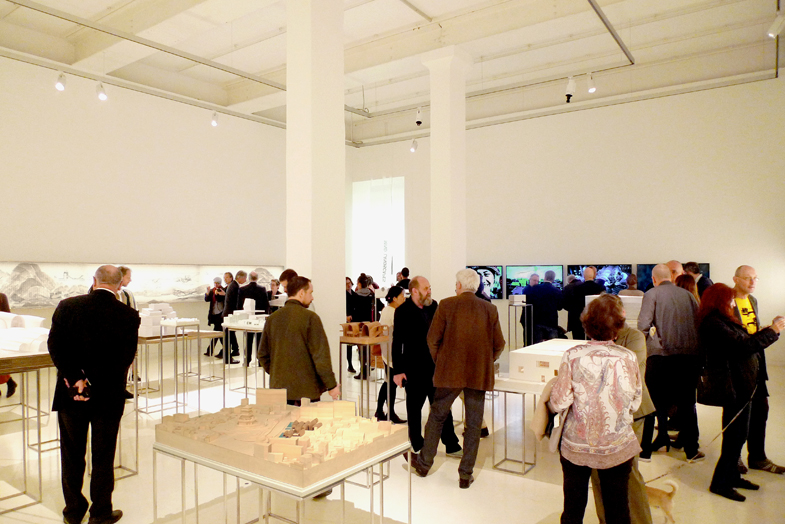
The high speed of urbanization under the commercial pressure of a mass and consumer society requires reflected concepts that also serve the need for authentic expression in architecture. In the cacophony of urban collages and architectural super signs against the backdrop of the real megacity, Zhu Pei has set off in search of his own roots within traditional aesthetic concepts, successfully adapting them for implementation in his work. By drawing on traditional concepts of space and the built structure, he has been able to devise solutions that are specific to the location or region, while demonstrating great skill in terms of form, aesthetics, and materiality. Informed by an understanding of the global architectural discourse, he follows his own path to give each of his buildings a specific character within a contemporary architectural form. The buildings stand out as individual, creative solutions that have been developed with remarkable sensitivity to the urban and cultural context. With his architectural accomplishments, Zhu Pei is considered to be at the vanguard of contemporary architecture in China. (From the article Narrative Landscapes, written by Dr. Eduard Kögel)
This exhibition presents five large cultural buildings by the architect, which are currently being built: the Yangliping Performing Arts Center and the Museum of Contemporary Art, both in Dali, the Shijingshan Cultural Center in Beijing, the Shou County Culture and Art Center in Anhui province, and the Imperial Kiln Museum in Jingdezhen. The buildings stand out as individual, creative solutions that have been developed with remarkable sensitivity to the urban and cultural context. Zhu Pei responds to the conditions at hand, articulating his surroundings in a modern architectural language or integrating the new buildings into the given context. The numerous models, plans, and films on display illustrate the specific relationships between the projects and their surrounding environment. The buildings’ powerful formal expression is revealed in an installation against a backlit panoramic background of the architect's striking ink drawings.
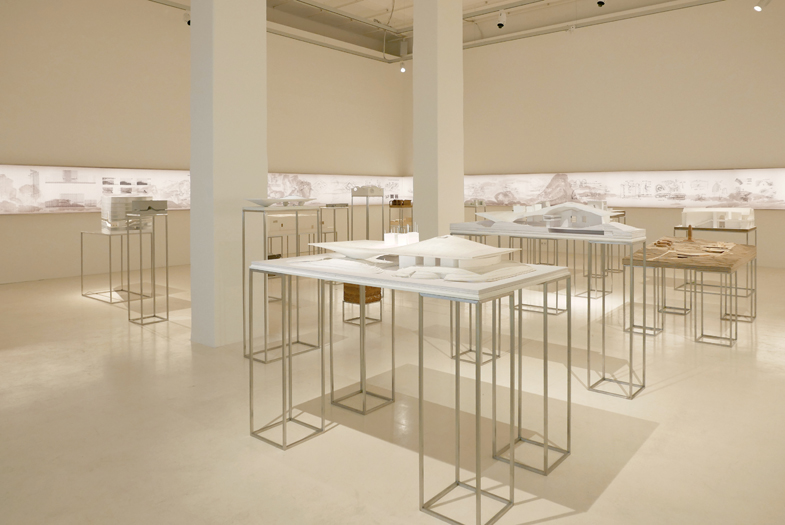
Zhu Pei views “not traveling far for the communion of the soul” as an attitude, revealing other possibilities for contemporary architecture in which the natural philosophy of traditional Chinese culture can be reinterpreted within a contemporary context, demonstrating the tectonic principle of the common source of man and nature. The exhibition is at once an architectural experiment and a new departure, demonstrating that “natural architecture” builds not only an external world but also a dwelling for the soul. (From the article Immortality in Passing, written by Wang Mingxian)
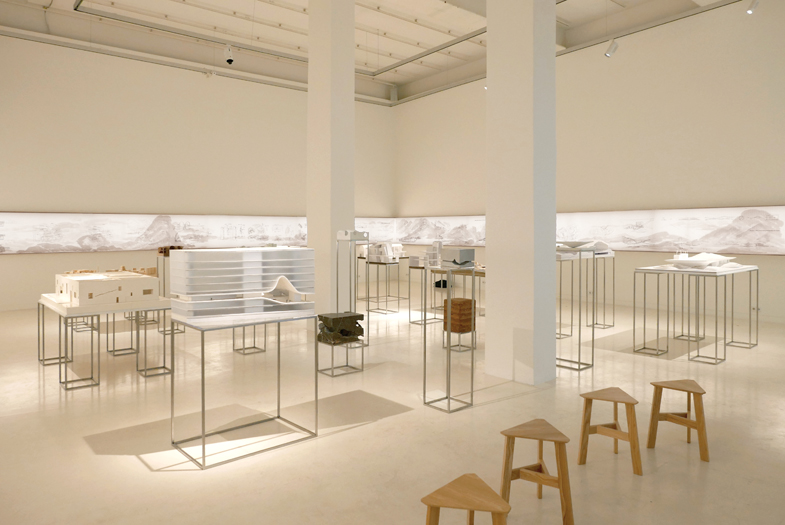
A number of famous architectural scholars from China were specially invited to attend the symposium, including Aric Chen, chief curator of architecture and design of Hong Kong M+ Museum, Zhou Rong, architectural critic and Professor of Tsinghua University, Li Xiangning, architectural critic, visiting professor of Harvard University and Professor of Tongji University, to have a dialogue with European architectural theorists in Berlin.
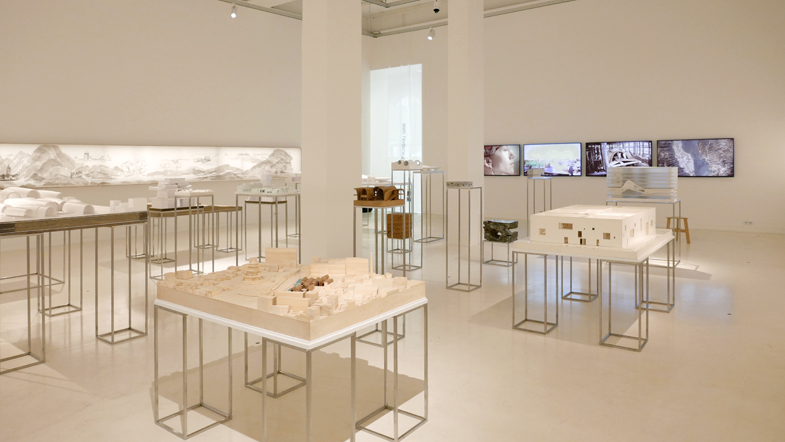
The exhibition catalogue Mind Landscape: Studio Zhu Pei published a number of articles includes Mohsen Mostafavi, professor and Dean of the school of design of Harvard University, Wang Mingxian, architectural critic and artist, Zhou Rong, architectural critic, Professor of the school of architecture of Tsinghua University, and Li Xiangning, architectural critic, visiting professor of Harvard University, Professor of Tongji University.
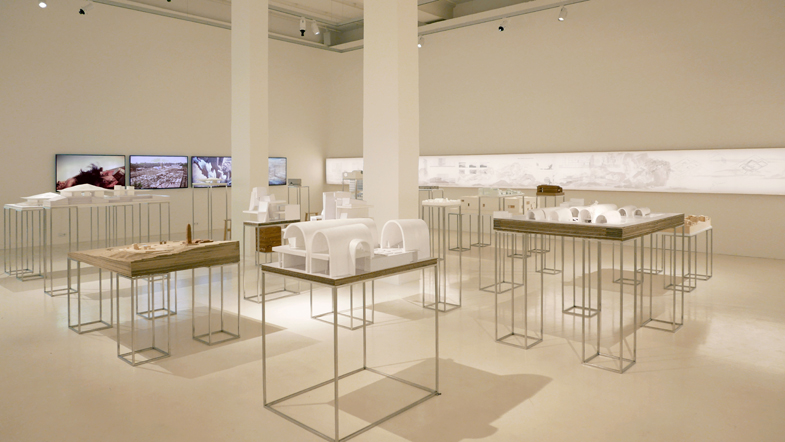
About Aedes
Founded in 1980, Aedes in Berlin is the most important institution in Europe to study and display the most outstanding contemporary architectural practice in the world. International contemporary architects such as Zaha Hadid, Daniel Libeskind, Frank O. Gehry and Rem Koolhaas have held exhibitions here. Aedes is also the first international professional institution overseas to start and consistently pay attention to the practice of Chinese contemporary architecture. It planned the "civil engineering" exhibition as early as 2002, and the participating architects will become the mainstay of Chinese contemporary architecture in the future.
Exhibition Venue:Aedes Architecture Forum, Christinenstr. 18-19, 10119 Berlin
Exhibition Date:1 April-18 May 2017
Opening Hours:Tuesday-Friday 11:00 am-6:30 pm, Sunday-Monday 1:00–5:00 pm
Studio Zhu Pei's solo exhibition "Mind Landscapes" opened at Aedes in Berlin
2017.04.01
On March 31, Studio Zhu Pei’s first architectural solo exhibition "Mind Landscapes" opened at Aedes in Berlin.
The exhibition theme "Mind Landscape" directly introduces the aesthetic concept of "artistic conception" in traditional Chinese landscape painting. This concept best defines the creative thinking, exploration and practice of Studio Zhu Pei in recent years.

The high speed of urbanization under the commercial pressure of a mass and consumer society requires reflected concepts that also serve the need for authentic expression in architecture. In the cacophony of urban collages and architectural super signs against the backdrop of the real megacity, Zhu Pei has set off in search of his own roots within traditional aesthetic concepts, successfully adapting them for implementation in his work. By drawing on traditional concepts of space and the built structure, he has been able to devise solutions that are specific to the location or region, while demonstrating great skill in terms of form, aesthetics, and materiality. Informed by an understanding of the global architectural discourse, he follows his own path to give each of his buildings a specific character within a contemporary architectural form. The buildings stand out as individual, creative solutions that have been developed with remarkable sensitivity to the urban and cultural context. With his architectural accomplishments, Zhu Pei is considered to be at the vanguard of contemporary architecture in China. (From the article Narrative Landscapes, written by Dr. Eduard Kögel)
This exhibition presents five large cultural buildings by the architect, which are currently being built: the Yangliping Performing Arts Center and the Museum of Contemporary Art, both in Dali, the Shijingshan Cultural Center in Beijing, the Shou County Culture and Art Center in Anhui province, and the Imperial Kiln Museum in Jingdezhen. The buildings stand out as individual, creative solutions that have been developed with remarkable sensitivity to the urban and cultural context. Zhu Pei responds to the conditions at hand, articulating his surroundings in a modern architectural language or integrating the new buildings into the given context. The numerous models, plans, and films on display illustrate the specific relationships between the projects and their surrounding environment. The buildings’ powerful formal expression is revealed in an installation against a backlit panoramic background of the architect's striking ink drawings.

Zhu Pei views “not traveling far for the communion of the soul” as an attitude, revealing other possibilities for contemporary architecture in which the natural philosophy of traditional Chinese culture can be reinterpreted within a contemporary context, demonstrating the tectonic principle of the common source of man and nature. The exhibition is at once an architectural experiment and a new departure, demonstrating that “natural architecture” builds not only an external world but also a dwelling for the soul. (From the article Immortality in Passing, written by Wang Mingxian)

A number of famous architectural scholars from China were specially invited to attend the symposium, including Aric Chen, chief curator of architecture and design of Hong Kong M+ Museum, Zhou Rong, architectural critic and Professor of Tsinghua University, Li Xiangning, architectural critic, visiting professor of Harvard University and Professor of Tongji University, to have a dialogue with European architectural theorists in Berlin.

The exhibition catalogue Mind Landscape: Studio Zhu Pei published a number of articles includes Mohsen Mostafavi, professor and Dean of the school of design of Harvard University, Wang Mingxian, architectural critic and artist, Zhou Rong, architectural critic, Professor of the school of architecture of Tsinghua University, and Li Xiangning, architectural critic, visiting professor of Harvard University, Professor of Tongji University.

About Aedes
Founded in 1980, Aedes in Berlin is the most important institution in Europe to study and display the most outstanding contemporary architectural practice in the world. International contemporary architects such as Zaha Hadid, Daniel Libeskind, Frank O. Gehry and Rem Koolhaas have held exhibitions here. Aedes is also the first international professional institution overseas to start and consistently pay attention to the practice of Chinese contemporary architecture. It planned the "civil engineering" exhibition as early as 2002, and the participating architects will become the mainstay of Chinese contemporary architecture in the future.
Exhibition Venue:Aedes Architecture Forum, Christinenstr. 18-19, 10119 Berlin
Exhibition Date:1 April-18 May 2017
Opening Hours:Tuesday-Friday 11:00 am-6:30 pm, Sunday-Monday 1:00–5:00 pm